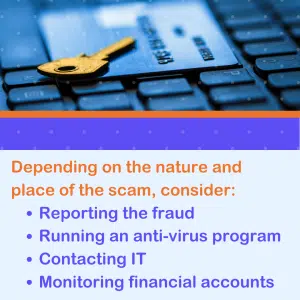*Disclaimer: The following is general information on job scams and is not intended as legal advice.
Protecting Yourself After a Job Scam
Job scams can pose a threat to one’s safety, finances, and privacy. Depending on the nature and place of the scam, there is no one easy solution, but here are a few tips that may help.

- You may want to consider reporting the scam.
- If you found the job listing on an online job board or website (Ex. Indeed, LinkedIn, etc.), you can contact the platform directly to report the job scam.
- Here are some additional organizations to report job scams to:
- Federal Trade Commission (FTC)
- Internet Crime Complaint Center (IC3)
- Better Business Bureau (BBB)
- State Attorney General’s Office
- U.S. Postal Inspection Service (USPIS)
- You may want to consider running an anti-virus scan program or contacting IT.
- If a link was clicked, run Norton or another anti-virus scan program to confirm that nothing has been downloaded to your computer.
- If you are unsure whether you downloaded a virus, you can take the computer to a local, in-person computer repair place and have them check it to ensure nothing has been loaded onto the computer.
- You may want to consider monitoring credit and other financial accounts closely.
- While it depends on how much and what information was obtained by the scammer, if at any point you shared any credit card, bank, or other personal or financial information, monitoring your credit accounts closely can assist you in catching an unusual activity early.
Additional Links/Resources


